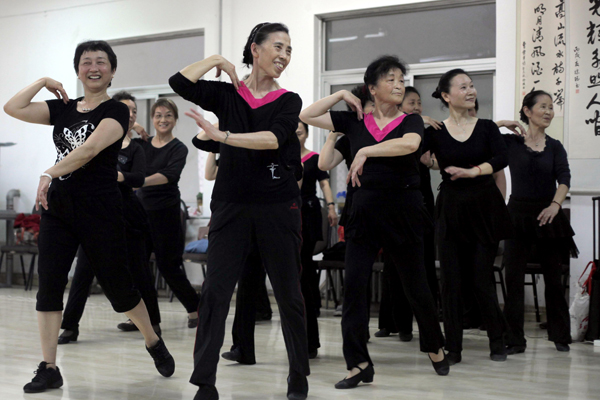Experts call for more time off
Workers failing to take full holiday entitlement
Labor experts have called for China to allow more holidays for workers to visit their parents, as authorities aim to increase family care for older generations.
Family members should visit or send greetings to relatives aged 60 or above on a regular basis, under an amended law to protect the rights and interests of the elderly and promote "the Chinese virtue of filial piety". The new regulation took effect on July 1.
 |
|
Tang Chongqin (second from left), a 71-year-old dance teacher at a university for the elderly in Beijing, practices dancing with her students in May. Universities for the elderly are popular among the senior residents in the capital after their retirement. Wang Jing / China Daily |
People employed for more than a year by government departments, institutions affiliated with the government or State-owned companies are entitled to an extra 20 days of leave every year to visit spouses or parents if they live elsewhere in China and cannot reunite with them during regular holidays, under regulations introduced in 1981.
But an online poll found that most such employees have never taken the extra days, even though the regulation was approved by China's top legislative body, the National People's Congress, more than 30 years ago.
The survey by Sina, a major Internet company, had received more than 32,900 responses by Sunday afternoon, and 50.8 percent said they dared not ask for the leave but would like to take it.
More than a third were not aware of the regulation, and 55 percent said their company does not allow such leave.
"I have never taken such leave," one respondent wrote. "I can't even count on free time on weekends, let alone other holidays. Our boss makes the rules in the company."
Another respondent, who said he was a doctor, added, "If employers cannot arrange for the leave they are entitles to, going back home to visit parents would be impossible."
Chen Xiaobing, a manager with China Broadcasting Beijing Co and a member of the Beijing committee of the Chinese People's Political Consultative Conference, wrote on his Sina micro blog: "The regulation (on leave for family reunion) was passed 32 years ago and has long been outdated."
The measure, which covers only workers at government and State-owned enterprises, excludes employees of private or foreign-owned companies, which is unfair, he said.
The private sector, which accounted for only a slight portion of China's economy three decades ago, has been developing rapidly since China took up economic reform in the late 1970s. By the end of last year, more than 80 percent of employees in China worked at private companies, according to government figures.
"The regulation sounds ridiculous," said Zhang Qian, a worker at a large IT company in Beijing. "Such a regulation really annoys those of us who work for private companies. I think this is just welfare exclusively for government workers."
Zhang, who comes from East China's Anhui province, said she has never had such a long holiday since she joined the company three years ago after graduating from Renmin University of China.
"I'd ask for leave every year if my company allowed it," she said. "But it is impossible for us to take so much time off because everyone is responsible for his or her own work in our company. Sometimes the pressure is stifling."
A worker at a government-affiliated research institute in Beijing, who gave only his surname, Yuan, said he is entitled to a special 20-day leave annually to visit his parents back home but has never asked for it because his work is very busy and he cannot afford to ask for so long off.
Zhou Xiaozheng, a sociologist at Renmin University of China, said whether children go back to visit and care for their aging parents is a matter of morality and should not be defined by laws, as it would be difficult to enforce.
Further amendments are needed to make the law urging family members to visit their parents effective, while the interests of enterprises should also be considered, he said.
"A realistic question is, who will pay for losses incurred by an enterprise if all its employees stay away for 20 more days a year?"
Registration Number: 130349



























